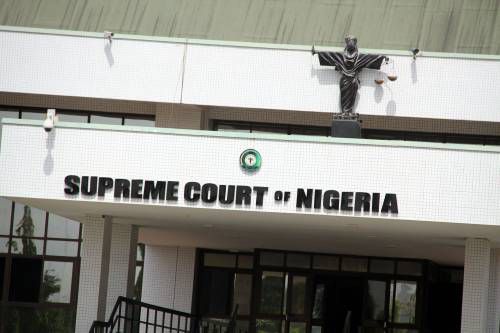
The Supreme Court has scheduled October 22, 2024, for the hearing of a lawsuit filed by at least 16 state governments challenging the constitutionality of the laws establishing the Economic and Financial Crimes Commission (EFCC) and two other anti-corruption agencies.
A seven-member panel of justices, led by Justice Uwani Abba-Aji, fixed the date after the states were joined as co-plaintiffs and granted leave to consolidate the case in the suit originally filed by the Kogi Government through its Attorney General.
The states that joined the lawsuit are: Ondo, Edo, Oyo, Ogun, Nassarawa, Kebbi, Katsina, Sokoto, Jigawa, Enugu, Benue, Anambra, Plateau, Cross-River, and Niger.
The 16 states said they are relying on the fact that the Nigerian constitution is the most important law in the country, and any law that does not follow it is illegal.
The plaintiffs argued that the Supreme Court, in Dr Joseph Nwobike Vs Federal Republic of Nigeria, that the law that created the EFCC was based on a United Nations agreement against corruption and that in enacting this law in 2004, the provision of Section 12 of the 1999 Constitution, as amended, was not followed.
They argued that, in bringing a convention into Nigerian law, the provision of Section 12 must be complied with.
The states contend that the law establishing the EFCC was enacted without the necessary approval from the majority of state Houses of Assembly, as required by the Nigerian Constitution. They argue that any institution formed without such approval is illegal.
When the case was called on Tuesday, lawyers, who represented the states, made their submissions. While the majority sought to be joined as co-plaintiffs, two of the states prayed for an order for consolidation of the case.
According to counsel for Kogi State, Attorney General Abdulwahab Mohammed, SAN, there were states that indicated interest in consolidation of the case and those seeking to be joined as co-plaintiffs.
“It is for this honourable court to tell us how to proceed my lord.
“Out of about 15 states, there are about 13 of them that have indicated interest to be co-plaintiffs and only two want consolidation.
“To make the task of the court easier, those who want to be joined as co-plaintiff should be joined and abide by the processes already filed and those who sought consolidation should be asked to file within seven days,” Mohammed said.
After the lawyers’ submissions, Justice Abba-Aji granted their prayers. She adjourned the matter until Oct. 22 for a hearing.
